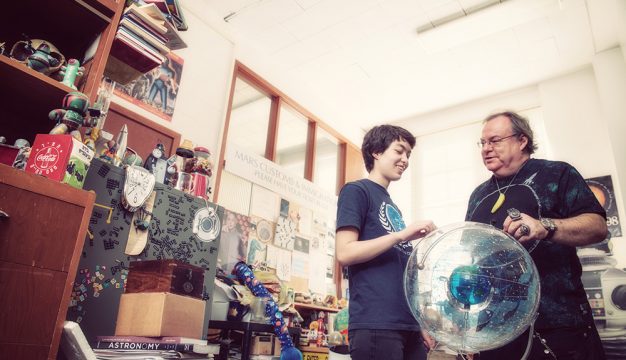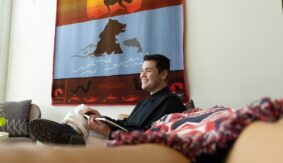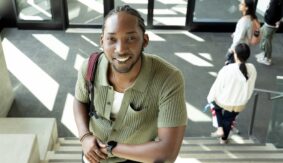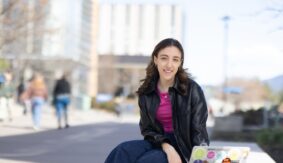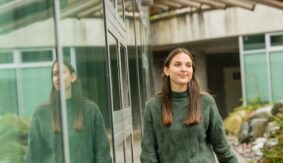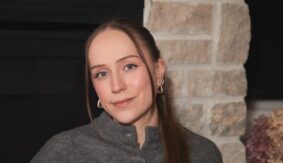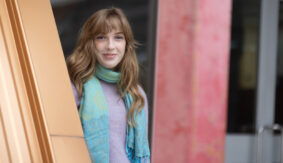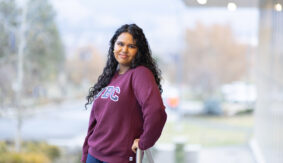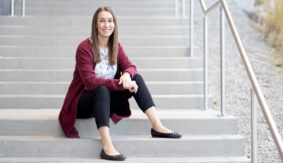
Astronomy student Michelle Kunimoto shares the details of her planetary discovery and what it means for the future – hers, and the search for life on other planets
Just in time for graduation from UBC this spring, Michelle Kunimoto will be adding an impressive entry to her resumé: discovered four new planets. Michelle – who earned a Bachelor of Science in combined honours Physics and Astronomy, at UBC’s Vancouver campus – pinpointed four new worlds beyond our solar system. The “planet candidates,” as they’re called until they can be independently confirmed, range from Mercury-sized to slightly larger than Neptune.
Michelle will start her master’s degree in Astronomy at UBC this fall, and plans to pursue a PhD, with dreams of working for NASA. Her undergraduate research experience with UBC professor Dr. Jaymie Matthews has left an indelible mark, and Michelle says she’d ultimately like to enter academia and “send the elevator back down” to her own students one day.
How did you discover these four new planets?
I looked through Kepler light curves (measurements of the brightness of stars over time) for signs of planetary transits. When an object passes in front of, or “transits,” a star, it blocks a portion of that star’s light, so you see a small, temporary decrease in brightness. If these dips happen periodically it’s a promising sign that there’s a planet orbiting the star.
In particular, I was keeping an eye out for very weak transits (small, hard-to-see dips), since they would have been either more likely to be missed by the Kepler team, or so weak that the team would have automatically labelled them as false alarms and not have put them through further testing.
Michelle Kunimoto (left) with UBC Physics and Astronomy professor Dr. Jaymie Matthews.
What is the significance of these discoveries, both in the science community and beyond?
The discoveries demonstrate that there are indeed additional and scientifically interesting planet candidates still to be found in Kepler data, including weak signals that have automatically been discarded in previous searches. Also, one of the candidates is in the Habitable Zone – the range of distances from a star in which a planet can support liquid water on its surface – which has exciting implications for the search for life in the Galaxy.
Can you tell us more about the planet in the Habitable Zone?
It’s the “warm Neptune” KOI-408.05 that’s in the Habitable Zone of its star. Habitable Zone planets are some of our best guesses at where we might find other signs of life in the universe. KOI-408.05 is probably more like the giant planets in our own solar system in that it’s probably gaseous, and not rocky like our Earth, so it’s not the best candidate for life. However, if it has a moon large enough to maintain an atmosphere, then that moon could support water – and potentially life. Think Pandora from the movie Avatar – it wasn’t actually a planet, but a habitable moon orbiting a giant planet. This candidate also has one of the longest orbital periods of all Kepler planets and candidates, making it an even rarer find.
How did the discovery relate to your coursework at UBC and your research position?
I took a course on exoplanets and astrobiology (ASTR 333) last year, which was taught by Dr. Jaymie Matthews. I loved the course so much that when I applied for an NSERC Undergraduate Student Research Award last summer, I listed Dr. Matthews as my top choice for a research supervisor and “exoplanets” as my main research interest. The research he assigned me was looking through Kepler data, and that search later turned into part of my undergraduate thesis.
“Dr. Matthews has given me so many opportunities, and established contacts for me with scientists around the world. I’d like to ‘send the elevator back down’ and be able to do that for my own students one day.” – Michelle Kunimoto, Combined honours Physics and Astronomy ’16
Will you be continuing any of your undergraduate research into your master’s degree?
I’ve only looked at 400 Kepler light curves, but there are thousands more and I’d love to keep going with the search! That being said, the discoveries were already the focus of my undergraduate thesis, so I’ll likely work on something else for my master’s. I can always search for more planets in the background. I’d still like to continue working on some kind of exoplanet research for my master’s degree.
How did you first become interested in astronomy?
I’ve always been interested in astronomy, but I became certain I wanted to follow it after my dad introduced my brother and me to Star Trek: The Original Series back in high school. I loved how Star Trek explored big ideas about space, society, and science, and it portrayed scientists as adventurers full of curiosity. It showed an optimistic and hopeful view of the future of humanity. Sure, it was campy, but it was way ahead of its time and has inspired generations. I got hooked on it immediately, and I’m still a huge Trekkie and science-fiction fan.
What kind of career will you pursue after you earn your master’s degree?
My goal is to get a PhD after my master’s. I’d love to work with NASA or just do research for a while, but I’d also like to do academia eventually. Dr. Matthews has given me so many opportunities, and established contacts for me with scientists around the world. I’d like to “send the elevator back down” and be able to do that for my own students one day.
